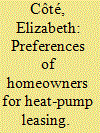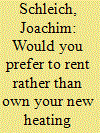|
|
|
Sort Order |
|
|
|
Items / Page
|
|
|
|
|
|
|
| Srl | Item |
| 1 |
ID:
111098


|
|
|
|
|
| Publication |
2012.
|
| Summary/Abstract |
In order to reduce the energy consumption of the building stock, a major trend is to drastically reduce the space-heating (SH) needs by improving the thermal performance of the envelope. In general, this measure is combined with efficient heating systems to minimize the delivered energy and greenhouse gas emissions. Nevertheless, these better systems are often more expensive so that the extra-investment could be hardly recovered for small-scale energy consumption. The main objective of the article is to show how equilibria between cost-effectiveness and environmental performance of heating systems are changed when small SH needs are considered (i.e. for passive and low-energy houses). The scope is limited to new single-family dwellings. Furthermore, the passive house standard provides means of simplifying the SH by using the ventilation air: the idea is that savings should counterbalance the extra-investment in super-insulation. In theory, a new global economic optimum is generated at the passive house level. The second objective of the work is to study which conditions could lead to this new optimum. Only a detached-house typology is investigated to address this last issue. Regarding methodology, all the investigations are done considering the Belgian context. Energy and environmental performance is evaluated using a method that complies with the EN-15603 and EN-15316 standards.
|
|
|
|
|
|
|
|
|
|
|
|
|
|
|
|
| 2 |
ID:
192775


|
|
|
|
|
| Summary/Abstract |
While heat pumps are a promising solution for decarbonizing residential buildings, financial barriers often hinder their diffusion. Asset leasing – whereby service providers lease equipment and provide services in exchange for monthly payments – could help overcome some of the barriers to adoption. This study investigates homeowners' preferences for heat-pump leasing, examines their inclination to lease or purchase, and quantifies their willingness to pay for different services. Empirical insights are drawn from a discrete choice experiment conducted with 915 single-family house owners who undertook 9150 hypothetical leasing decisions in France, Germany, and Switzerland. Survey results show an interest in flexible, all-inclusive leasing offerings, especially in markets where heat pumps are at an early stage of diffusion. However, preferences for asset leasing differ between countries. German house owners are the most open to leasing and would on average be willing to pay up to three times more than their French counterparts to shield themselves against technical risk. Given the role asset leasing could play in decarbonizing residential heat and enhancing energy security, policy makers may wish to adapt policy incentives to account for these service-based offerings.
|
|
|
|
|
|
|
|
|
|
|
|
|
|
|
|
| 3 |
ID:
181424


|
|
|
|
|
| Summary/Abstract |
By offering to rent energy technologies, energy suppliers and other companies may tap into new market segments, allowing them to preserve or increase market shares. Because such rental services can help overcome capital-related and other barriers to energy efficiency, they may also contribute to achieving ambitious energy and climate targets. Yet, empirical analyses of renting energy technologies are scarce. Employing a large-scale discrete choice experiment among owner-occupiers in the United Kingdom, this study explores households' willingness-to-pay for renting compared to owning their new heating system. The findings obtained from mixed logit models suggest that, on average, participants strongly dislike renting compared to owning their new heating system, in particular owner-occupiers who are older than 70 years. However, about a third of the sample is estimated to prefer renting. On average, participants also value heating cost savings associated with energy-efficient heating systems and longer warranty periods. Finally, the paper discusses implications for policy-makers and for providers of heating system rental services.
|
|
|
|
|
|
|
|
|
|
|
|
|
|
|
|
|
|
|
|
|